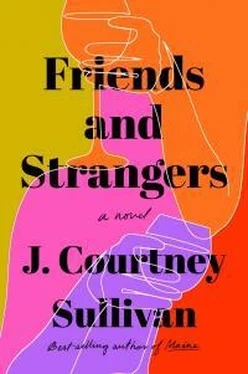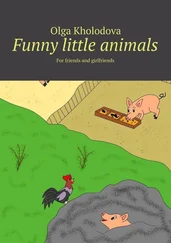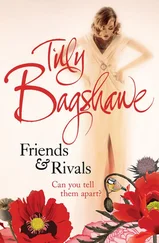She supposed it was childish, simplistic, but Sam still could not square the discrepancies of lives that overlapped with one another every day. She looked at the people digging up roads and busing dishes and caring for other people’s children—holding up the world—and wondered what they’d rather be doing. She was thirty-one years old, and she couldn’t quite accept that some people would be allowed and encouraged to pursue their passions, while others never would.
But she knew that whether she accepted it or not did nothing to erase the fact of it. Every year it seemed the country moved closer and closer to a place where there would soon be very rich people and very poor people, and very few in between.
Sam walked on. She went through the campus gates. There had long been a legend that any girl who did this before graduation would never marry. Ridiculous, but back then Sam hadn’t taken the chance. She always went around, in case.
She had recently started telling people she wasn’t sure she ever wanted to get married. Each time she said it, she wondered if it was true. In the last two years, she’d been a bridesmaid five times. She had gone to three dinner parties where she was the only uncoupled attendee. When Isabella got married, Sam didn’t feel any twinge of jealousy. But when Isabella had a baby, bought a house, she suddenly grew aware of how behind she had fallen.
Sam lived alone now, in an apartment on the top floor of a house built in 1790. She sensed the ghosts of its past hanging around when the hardwood creaked beneath her bare feet each morning, when the light in the kitchen flickered for no reason.
Sam continued on until the downtown came into view.
When she lived here, there wasn’t a single chain store besides CVS and, at the end of senior year, a Starbucks. Now almost every storefront advertised a familiar restaurant franchise or clothing brand. The historic old movie theater had been converted into a Citibank.
She stood at the crosswalk at Plum and Main, waiting for the light to change. As it did, and the WALK sign lit up, a black SUV slowed to a stop in front of her. The woman behind the wheel was slight, eclipsed by her automobile. She swiveled her head and said something to the children in the back seat.
Sam started to cross as the driver faced forward.
Elisabeth.
It was her, there was no doubt. She looked exactly the same.
After college, for a while, Sam kept track of her.
She had the urge to tell Elisabeth when she learned that Clive had gotten married, a year after they broke up. It stung at the time, even though Sam had been the one to end things. Those first few months in the city, she relied on their unclean break, on the fact that she could always call him or run off to be with him if she wanted. When the option was no longer hers, she grieved over it, if not over the loss of Clive himself.
Sam was now almost the age he had been when they met. She had college interns at work. She marveled at how young they were. Just babies. She had never felt exploited by Clive, or taken advantage of. He was kind and encouraging and loyal. He had loved her. But it did occur to her that at the time it had seemed like no one else understood, when maybe she was the one who didn’t.
Once, when she was twenty-six, eating dinner with friends at a café in the West Village, she saw a poster advertising a reading by the poet Julian Wells.
There he was, smiling in his photograph. Julian, the Mollusk, from the campus library. He looked good. He’d figured out what to do with that tight, curly hair, letting it grow out a bit. He wore glasses and had a beard. Nerds were having a moment in the city, and Julian looked as if he was making the most of it.
The bio on the poster said he had published a poem in the Atlantic and had a forthcoming book. He was teaching at Columbia that semester. Sam was at a particularly lonesome point. Staring at the poster, she wondered if she had taken a wrong turn all those years ago, one which she would never be able to correct. She went so far as to email Julian at his Columbia address after a few glasses of wine. She tried to sound breezy—how funny they had both landed in New York at the same time, maybe they should meet for coffee. He never wrote back.
That same year, Elisabeth published her book The Hollow Tree to much acclaim.
Sam found it on the new nonfiction shelf at Shakespeare & Co. one snowy afternoon. She flipped through, searching for some mention of herself, but there wasn’t one. There was a chapter about a discussion group, made up of old men who met at a small-town coffee shop to talk through the ills of the world. Elisabeth quoted them, but used fake names. Sam tried to guess who had said what.
The last five pages of the chapter focused on a man she called Larry, who ran a lucrative car service, until Uber put him out of business. After building a name for himself as a volunteer advocate for workers’ rights, Larry got a job as a union organizer.
That had made Sam smile.
She still saw examples of the Hollow Tree everywhere, even more so after they lost touch. George used to shake his head and say, Where can this possibly be headed? Sam thought of that when she read about the ever-worsening state of the country, when the members of her family who had always loved debating politics had to stop talking about the subject, or else stop talking, period. When so many of the things George had predicted came true.
Even though she did not name him in the story, Elisabeth acknowledged that her book wouldn’t exist without George. The Hollow Tree was dedicated to him.
Elisabeth crossed Sam’s mind again months later, when Sam was moving out of the apartment she and Maddie shared in New York. As Sam filled a box with books, a photograph slipped out of one—in it, Sam was holding Gilbert, the strap of her top obscured, the baby visible only from the waist up, so that it appeared both of them were naked. Inspiration for a painting she had never finished, never delivered. She wondered what happened to it and, in turn, to Elisabeth. Had she ever told Andrew the truth? Were they still together?
Sam was almost certain that was the last time she thought of her. The years passed faster, the older she got. There was less time to ruminate, less time for everything. Less time.
But now Elisabeth was in front of her, looking confused as to why some random woman was waving.
Until she seemed to realize. She rolled down her window.
“Sam?” she said. “I didn’t recognize you. You look fantastic. You’re all grown up.”
For a moment, it was just the two of them, as it had been years before.
Elisabeth turned and said, “Gil! This is Sam. She was your first babysitter.”
The boy in the back seat was tall and lanky. He wore a shiny green basketball uniform. His blond curls were gone. He had shaggy brown hair now.
“Say hello,” Elisabeth said.
“Hi,” he said, bashful.
Sam was a stranger to him.
She could remember what it felt like to cross a room with the weight of his body pressed against her shoulder; the sensation of popping Cheerios into his mouth, one by one.
“And this is Willa,” Elisabeth said. “Willa, you weren’t even born yet when we knew Sam.”
The girl looked like Elisabeth. The same slender build, the same eyes.
Sam almost expected her to explain. The Elisabeth she remembered would have blurted out, Willa was adopted, or I ended up getting pregnant by accident after all that. Can you believe it?
Instead, in a voice that was warm, but somewhat formal, Elisabeth said, “What are you up to these days?”
Sam felt flustered, as if she were not an authority on her own life.
“I’m here for my tenth reunion,” she said finally. “I opened my own gallery last year.”
Читать дальше











